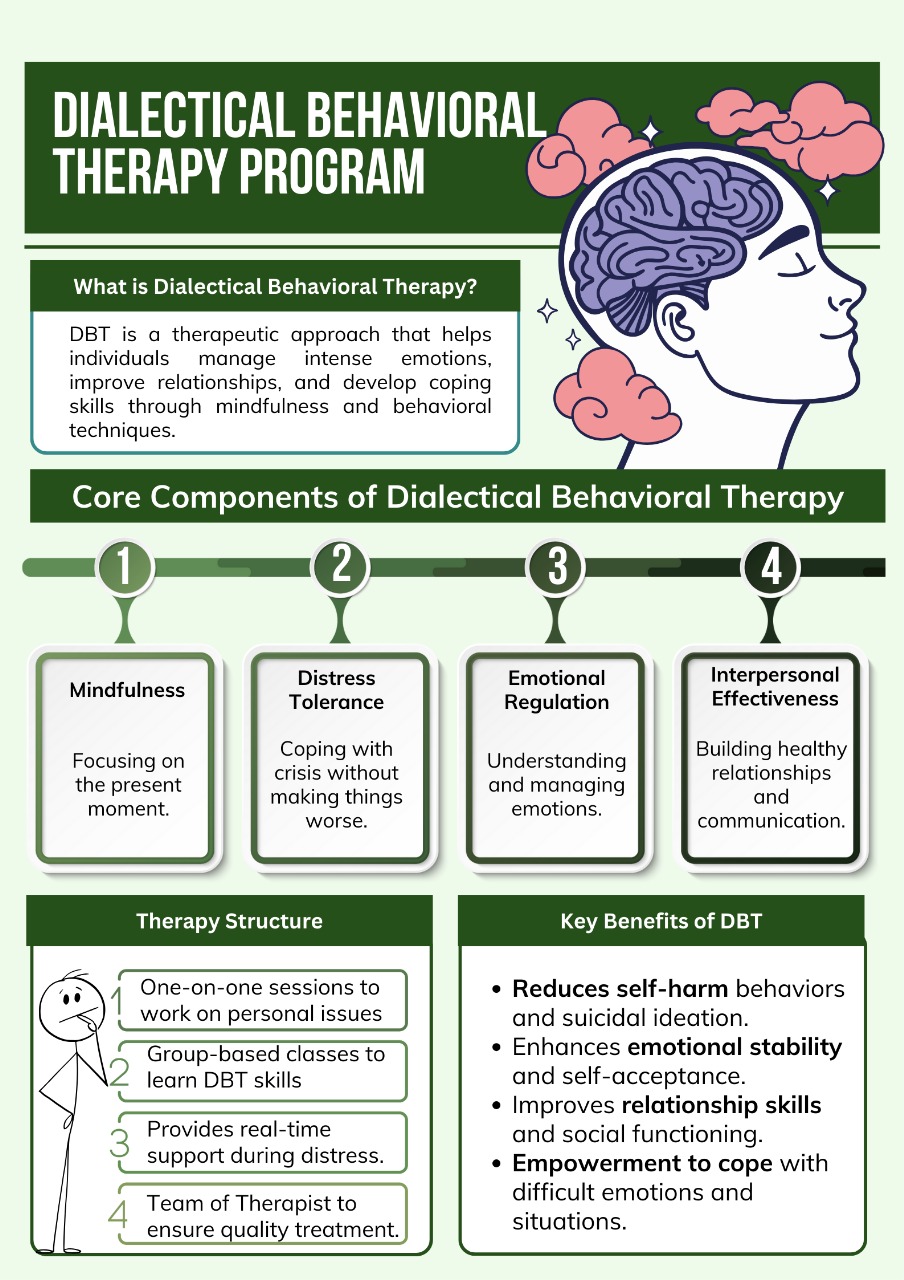DBT vs. CBT: Which Therapy is Right for Bedford Residents?

“Sometimes the bravest thing you can do is ask for help.”
How should someone in Bedford select the support they need when emotions become overwhelming or day-to-day stress becomes uncontrolled?
Almost 1 in 5 Massachusetts adults experience mental health issues regularly—even new data from the Centers for Disease Control and Prevention show that 19% of Massachusetts adults suffer from processing stress month after month. (National Library of Medicine (NIH)) This underscores a growing local demand for accessible, evidence-based interventions in areas like Bedford, where mental health can take a significant toll on quality of life.
At Forrest Behavioral Health, we strive to provide each individual in need of care the right treatment at the right time in their life.
Read on to learn more about the differences between these two treatments, why it is so important, and how our programs help Bedford residents thrive—no matter where the journey begins.
Understanding Cognitive Behavioral Therapy (CBT) at Forrest Behavioral Health
You know that nagging voice in your head saying, “everything’s doomed.”? CBT tackles it head-on. At Forrest Behavioral Health in Bedford, we use CBT to help folks identify twisted thoughts and swap them for healthier ones. Therapists guide you through sessions where you learn to spot patterns—like avoiding social spots because of anxiety—and flip the script.
Evidence and Impact of CBT
Research backs this up strongly. For instance, studies show CBT cuts depression symptoms by at least 50% in 43% of patients over time, far outpacing usual care. We see it daily in our outpatient programs. Have you ever caught yourself in a negative loop? CBT breaks it down with practical steps.
CBT Tailored for Bedford Lifestyles
Our approach fits Bedford’s busy lifestyles. Sessions run short, often 10 to 16 weeks, focusing on now rather than past digs. You build skills like problem-solving and relaxation.
Plus, we tailor it—whether for anxiety buzzing from Route 3 traffic or PTSD echoes.
Benefits of CBT at Forrest Behavioral Health
Here’s what CBT offers in our Bedford center:
- Quick wins: Notice changes in just a few meetings.
- Skill-building: Learn to challenge fears directly.
- Flexibility: Virtual or in-person options suit your schedule.
Transitioning smoothly, but what if acceptance feels more your speed? That’s where DBT shines.
Exploring Dialectical Behavior Therapy (DBT) and Our Specialized Program
DBT says, “Feel those emotions fully, then manage them wisely.” Originally for borderline personality disorder, it now tackles self-harm, addiction, and more. At Forrest Behavioral Health, our Dialectical Behavioral Therapy Program brings this evidence-based approach to Bedford, easing intense emotional storms. We emphasize emotion regulation and mindfulness.
Picture this: Instead of fighting anger, you accept it and choose better coping. Recent studies confirm DBT’s edge, reducing suicidality in BPD patients with moderate effects lasting up to two years. In Bedford, where stress from daily commutes builds, this resonates.
Evidence Supporting DBT’s Impact
Statistics highlight success—both therapies boast 50-60% rates, but DBT excels for intense emotions. We draw from real experience: Our 5-star Google reviews praise life-changing shifts, like one client noting,
“Forrest saved my life with compassionate guidance.”
Structure of Our Dialectical Behavioral Therapy Program
We offer comprehensive care through our Dialectical Behavioral Therapy Program:
Group skills training:
A 2.5-hour structured class that is held once a week and focuses on teaching mindfulness, distress tolerance, and interpersonal effectiveness.
Individual coaching:
Practice skills on personal challenges, such as family tensions or workplace stress.
Phone support:
Get in-the-moment guidance between sessions.

This structure supports co-occurring disorders, blending local expertise with proven methods. Why choose us? It’s tailored and evidence-based.
Four Key Steps of DBT at Forrest Behavioral Health, Bedford
Our Dialectical Behavioral Therapy Program follows four vital steps to guide Bedford residents toward recovery.
- First, we stabilize by reducing harmful behaviors like self-harm.
- Next, we enhance emotion regulation, helping you feel emotions without chaos.
- Third, we tackle everyday problems, like work stress.
- Finally, we foster a sense of completeness, empowering a fulfilling life.
Delivered through group training, individual therapy, and phone coaching, these steps build resilience. Have intense emotions ever overwhelmed you? Our program, rooted in evidence, offers practical tools to thrive.
Key Differences: DBT vs. CBT Tailored for Bedford Needs
CBT changes thoughts to alter behaviors, while DBT accepts emotions and builds coping. CBT suits short-term fixes for anxiety or depression; DBT’s year-long Dialectical Behavioral Therapy Program handles complex cases like BPD or trauma.
In Bedford, where adolescent anxiety spikes—over 30% of MA youth report persistent sadness—DBT’s focus on relationships helps families. CBT might remit depression faster, with 42% response rates versus controls. Yet, DBT cuts recidivism-like relapses by 40% in tough spots.
Aspect | CBT | DBT |
Therapy Focus | Change thoughts | Accept emotions |
Duration | 10–16 weeks | Year-long+ |
Best For | Anxiety, depression | BPD, trauma |
Core Strategy | Problem-solving | Mindfulness, regulation |
Session Structure | Individual, short | Group + individual |
Relapse Prevention | Immediate thought change | Long-term emotional resilience |
Family Support | Individual focus | Supports teens/adolescents |

Case Study: CBT vs. DBT
A published clinical study followed patients with anxiety and depression, comparing CBT and DBT outcomes. Results showed CBT led to quick symptom relief, notably easing depression in just three months, while DBT improved cognitive flexibility and planning—key for those with intense emotions.
Both therapies delivered lasting benefits, yet DBT excelled at emotional regulation and enhancing life satisfaction for participants with complex issues.
The study suggests integrating both options may provide the strongest recovery plan, offering fast relief with lasting change depending on individual needs.
Step Forward with Forrest Behavioral Health
When it comes to emotional well-being, there is no “one-size-fits-all”—CBT and DBT each offer powerful, research-backed solutions for Bedford residents striving for real change.
At Forrest Behavioral Health, experience shows DBT’s Dialectical Behavioral Therapy Program shines for those needing acceptance amid chaos, while CBT delivers swift cognitive shifts. Whichever path, Bedford’s community strengthens through compassionate care.
We’ve helped countless locals reclaim joy—join them. What’s holding you back?
Connect with Forrest Behavioral Health, and let’s create your path to brighter days—because your healing matters, and your community stands with you.












